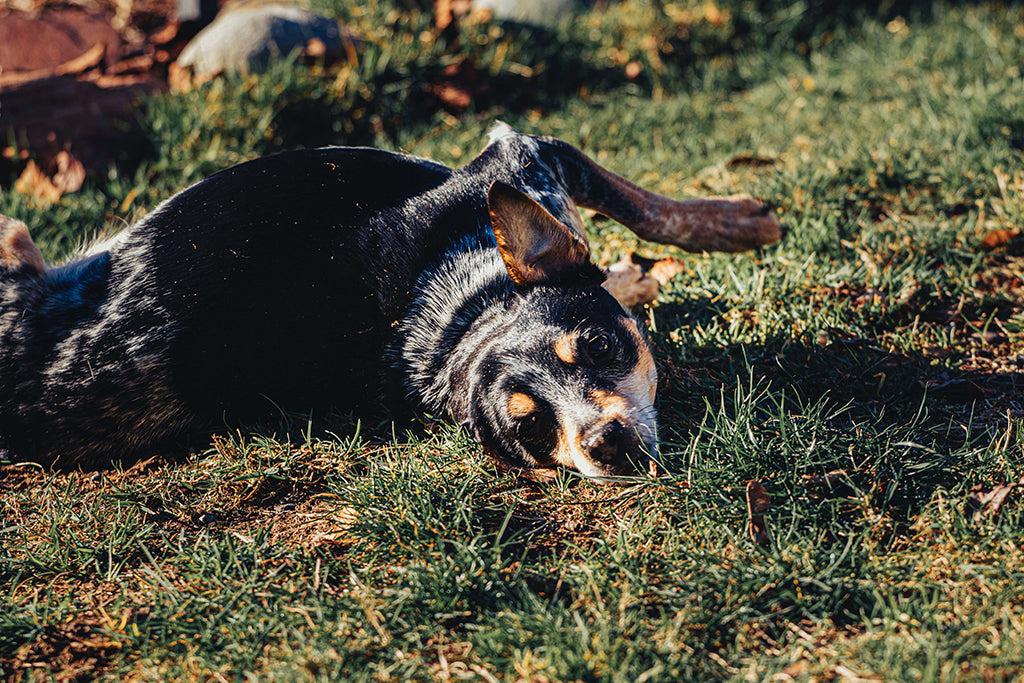Why Is My Dog Rolling In Poop?
“Why does my dog roll in poop?” Pet parents, we hear you! Many of us have had the dreaded scenario… Out in the park with your pup off the leash. Suddenly, they’re on their back, writhing, and wriggling – having the time of their life. Out of nowhere, you’re running to catch up with them but it’s too late – they are covered, stinky, and seemingly proud of themselves!
But, why do they do it? Where does the urge to roll in poop come from? And, more importantly, how can we get them to stop…?
Why Do Dogs Roll In Poop?
So, why do dogs like to roll in poop? It’s a very common behavior that many dogs display. Unfortunately, there’s no definitive answer, but there are some theories behind why dogs like to roll in poop so much! What these theories all agree on though, is that it’s an instinctual behavior that has been carried into their domestic lives from when they were wild.
1. They Could Be Marking Territory
Some scientists argue that rolling in poop is a way of dominating the scent of another dog with their own – a bit like when they urinate to mark their territory. The latter, however, is obviously a far more convenient method of masking another animal’s scent, so this is a widely disputed idea.

2. They Could Be Camouflaging Themselves
This is the most popular theory, as their wild relatives (wolves, for example) engage in similar behavior, too. Wolves are thought to do this to cover their own scent when they’re attempting to catch their prey. The poop essentially masks their scent, allowing them to approach their next meal more discreetly. Or, alternatively, they’re masking their scent from predators who see them as prey like their distant relatives grey foxes do.
So, poop rolling could just be a genetic instinct that domesticated dogs simply haven’t evolved out of yet.
3. They Could Be Communicating
Again, when comparing our domesticated doggies with their wild relatives, wolves are known to roll in their food, as well as other animal’s poop. This is thought to be a method of communicating to their pack that there’s food present and available. So, it’s theorized that rolling in animal poop may be to let pack members know that there are other animals in the area.
Dogs have an incredibly advanced smell in comparison to us, their human owners. Because of this, their scent is bound to play a part in the way dogs understand and communicate in their world. So, our doggos may simply be trying to communicate to other dogs on their turf when they’re rolling in smelly poop.
How To Stop A Dog From Rolling In Poop

Unfortunately, as this behavior is inherently instinctual as mutually agreed by all dog experts, training them out of it is virtually impossible. And, because it’s in-built and a genetically carried habit, punishing them for it is simply a cruel thing to do and won’t work. The best thing you can do is diminish the opportunity arising.
If there’s a walk that you love to go on together, keep your pooch on the leash so you can keep control over them when they approach something that looks particularly smelly. If you want to keep them off the leash, make sure you’re practicing and positively reinforcing their recall, so they’ll prioritize coming to you when called instead of choosing to roll.
In addition, pick up poop and any dead animals, mud build-up, or other smelly things like trash in the yard as soon as you spot them.
Got a pooch who loves rifling around and rolling in your trash? Secure your garbage cans effectively, so they can’t get in and pull out any dirty waste to eat and/or roll in.
If your dog does manage to get themselves covered in something stinky, make sure you bathe them ASAP with an odor-neutralizing, gentle shampoo. And, always wash your hands immediately after bathing your dog to remove something stinky – just to make sure whatever it was isn’t still on your skin.
Unfortunately, being a pet parent means you have to take the good, the bad, and the smelly – it’s all part and parcel of being a responsible, loving owner!
Remember, your dog loves you unconditionally: whether you’re stinky or not! And, it’s only fair that the same applies the other way around, right? However gross the smelly thing they rolled in is…
Sources
Co-Authored by Jones, Nick “Why Do Dogs Roll In Poop?” Pet Plan, Nov 17. 2021 https://www.petplan.co.uk/pet-information/blog/why-do-dogs-roll-in-poop/
Author Murphy, Kara “Why Dogs Roll In Poop (And Other Smelly Things)” Hills Pet, May 08. 2018 https://www.hillspet.com/dog-care/behavior-appearance/why-do-dogs-roll-in-poop






